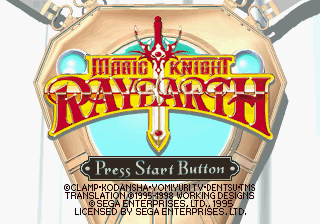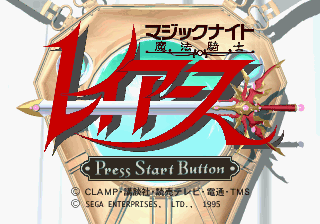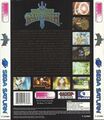Difference between revisions of "Magic Knight Rayearth (Saturn)"
From Sega Retro
m (→History) |
SEGAAA2004 (talk | contribs) |
||
| (23 intermediate revisions by 7 users not shown) | |||
| Line 1: | Line 1: | ||
{{Bob | {{Bob | ||
| bobscreen=Satrayearth01.png | | bobscreen=Satrayearth01.png | ||
| + | | bobscreen2=MagicKnightRayearth Saturn JP Title.png | ||
| + | | tab1=NTSC-U | ||
| + | | tab2=NTSC-J | ||
| title=Magic Knight Rayearth | | title=Magic Knight Rayearth | ||
| − | | publisher={{company|[[Sega]]|region=Japan}}, {{company|[[Working Designs]]|region=US}} | + | | publisher={{company|[[Sega Enterprises, Ltd.|Sega Enterprises]]|region=Japan}}, {{company|[[Working Designs]]|region=US}} |
| − | | developer=[[Sega | + | | developer=[[Sega RPG Production]]{{fileref|Sega Consumer History JP EnterBrain Book.pdf|58}}{{ref|https://twitter.com/rew_w/status/1694998120214806902}} |
| − | | licensor=Clamp, [[Kodansha]], [[Yomiuri TV]], Dentsu, [[TMS]] | + | | support={{company|[[Sega Digital Media]]{{ref|https://web.archive.org/web/20040519205447fw_/http://www.wave-master.com/wm/works/index.html}}|role=audio}} |
| + | | licensor=Clamp, [[Kodansha]], [[Yomiuri TV]], [[Dentsu]], [[Tokyo Movie Shinsha|TMS]], {{company|[[Sega Enterprises, Ltd.]]|region=US}} | ||
| system=[[Sega Saturn]] | | system=[[Sega Saturn]] | ||
| sounddriver=SCSP (1 track) | | sounddriver=SCSP (1 track) | ||
| Line 20: | Line 24: | ||
| sat_rating_jp_1=all | | sat_rating_jp_1=all | ||
| sat_type_jp_1=Shokai Gentei W Premium | | sat_type_jp_1=Shokai Gentei W Premium | ||
| − | | sat_date_us=1998-12- | + | | sat_date_us=1998-12-12{{ref|https://groups.google.com/g/rec.games.video.sega/c/4cynj4cyY5Q/m/1-MCjncPX6IJ}}{{ref|https://groups.google.com/g/rec.games.video.sega/c/3gCUHxbErKA/m/irnP9599HeIJ}}{{ref|https://groups.google.com/g/rec.games.video.sega/c/yeCAKDKSeZs/m/JSopuFx9ImUJ}} |
| sat_code_us=T-12706H | | sat_code_us=T-12706H | ||
| sat_rating_us=t | | sat_rating_us=t | ||
}} | }} | ||
| + | | properties={{Properties|SAT|cinepak|ssl}} | ||
}} | }} | ||
'''''Magic Knight Rayearth''''', known in Japan as '''''Mahou Kishi Rayearth''''' (魔法騎士 レイアース), is an RPG for the [[Sega Saturn]] based upon the [[wikipedia:Magic Knight Rayearth|CLAMP anime series of the same name]]. | '''''Magic Knight Rayearth''''', known in Japan as '''''Mahou Kishi Rayearth''''' (魔法騎士 レイアース), is an RPG for the [[Sega Saturn]] based upon the [[wikipedia:Magic Knight Rayearth|CLAMP anime series of the same name]]. | ||
| Line 75: | Line 80: | ||
==Production credits== | ==Production credits== | ||
| − | {{ | + | {{mainArticle|{{PAGENAME}}/Production credits}} |
| − | {{ | ||
| − | |||
| − | |||
| − | |||
| − | |||
| − | |||
| − | |||
| − | |||
| − | |||
| − | |||
| − | |||
| − | |||
| − | |||
| − | |||
| − | |||
| − | |||
| − | |||
| − | |||
| − | |||
| − | |||
| − | |||
| − | |||
| − | |||
| − | |||
| − | |||
| − | |||
| − | |||
| − | |||
| − | |||
| − | |||
| − | |||
| − | |||
| − | |||
| − | |||
| − | |||
| − | |||
| − | |||
| − | |||
| − | |||
| − | |||
| − | |||
| − | |||
| − | |||
| − | |||
| − | |||
| − | |||
| − | |||
| − | |||
| − | |||
| − | |||
| − | |||
| − | |||
| − | |||
| − | |||
| − | |||
| − | |||
| − | |||
| − | |||
| − | |||
| − | |||
| − | |||
| − | |||
| − | |||
| − | |||
| − | |||
| − | |||
| − | |||
| − | |||
| − | |||
| − | |||
| − | |||
| − | |||
| − | |||
| − | |||
| − | |||
| − | |||
| − | |||
| − | |||
| − | |||
| − | |||
| − | |||
| − | |||
| − | |||
| − | |||
| − | |||
| − | |||
| − | |||
| − | |||
| − | |||
| − | |||
| − | |||
| − | |||
| − | |||
| − | |||
| − | |||
| − | |||
| − | |||
| − | |||
| − | }} | ||
==Soundtrack== | ==Soundtrack== | ||
| Line 188: | Line 94: | ||
==Physical scans== | ==Physical scans== | ||
| − | {{ratings | + | {{ratings|SAT}} |
| − | | | ||
| − | |||
| − | |||
| − | |||
| − | |||
| − | |||
| − | |||
| − | |||
| − | |||
| − | |||
| − | |||
| − | |||
| − | |||
| − | }} | ||
{{Scanbox | {{Scanbox | ||
| console=Saturn | | console=Saturn | ||
| Line 233: | Line 125: | ||
==Technical information== | ==Technical information== | ||
| − | + | {{mainArticle|{{PAGENAME}}/Technical information}} | |
| − | {{ | ||
| − | {{ | ||
| − | |||
| − | |||
| − | |||
| − | |||
| − | |||
| − | |||
| − | |||
| − | |||
| − | |||
| − | |||
| − | |||
| − | |||
| − | |||
| − | |||
| − | |||
| − | |||
| − | |||
| − | |||
| − | |||
| − | |||
| − | |||
| − | |||
| − | |||
| − | |||
| − | |||
| − | |||
| − | |||
| − | |||
| − | |||
| − | |||
| − | |||
| − | |||
==External links== | ==External links== | ||
Latest revision as of 23:22, 4 November 2024
| ||||||||||||||||||||
| Magic Knight Rayearth | ||||||||||||||||||||
|---|---|---|---|---|---|---|---|---|---|---|---|---|---|---|---|---|---|---|---|---|
| System(s): Sega Saturn | ||||||||||||||||||||
| Publisher: Sega Enterprises (Japan), Working Designs (US) | ||||||||||||||||||||
| Developer: Sega RPG Production[1][2] | ||||||||||||||||||||
| Supporting companies: Sega Digital Media[3] (audio) | ||||||||||||||||||||
| Licensor: Clamp, Kodansha, Yomiuri TV, Dentsu, TMS, Sega Enterprises, Ltd. (US) | ||||||||||||||||||||
| Sound driver: SCSP (1 track) | ||||||||||||||||||||
| Peripherals supported: Saturn Backup Memory | ||||||||||||||||||||
| Genre: Action RPG[4], RPG[5] | ||||||||||||||||||||
| Number of players: 1 | ||||||||||||||||||||
|
Magic Knight Rayearth, known in Japan as Mahou Kishi Rayearth (魔法騎士 レイアース), is an RPG for the Sega Saturn based upon the CLAMP anime series of the same name.
Contents
Story
The world of Cefiro was at peace due to the divine protection of Princess Emerald, protecting the denizens of the land. One day, her personal guardian Zagat had turned rogue and betrayed the princess, imprisoning her in a fortress of solitude, thus causing havoc throughout Cefiro. Legends spoke of three warriors summoned from another world who would inherit their powers from ancient "Machines" and combine their strength to liberate the land from evil.
The princess then summoned three Japanese schoolgirls who happened to come together by a field trip to Tokyo Tower. They're immediately transported to the land of Cefiro and are shortly thereafter sent on a quest to free the princess and save the land of Cefiro from Zagat and his forces.
Gameplay
Players take control of three characters with three unique weapons and magical abilities, as well as personality traits that becomes apparent as the story unfolds. The gameplay is similar to The Legend of Zelda in an action/RPG hybrid featuring towns, non-player characters to interact with, puzzles and dungeons to explore. Characters can be switched at any time and have their own health and magic gauges. If all three characters lose their health, the player must restart from where they entered the area.
Items
Most items can be collected from either downed enemies or from chests hidden in each area.
| Gem Stone | |
|---|---|
| The currency of Cefiro that can be traded for other items in shops found in towns. | |
| Heart Ball | |
| Recovers health (HP) for the currently selected character. | |
| Magic Ball | |
| Recovers magic (MP) for the currently selected character. | |
| Heart Jewel | |
| Raises maximum HP by one point. | |
| Magic Jewel | |
| Raises maximum MP by one point. | |
| Health Potion | |
| Recovers HP for all characters. Any character who has no HP left automatically become revived. Can be held onto then used from the Item menu screen. | |
| Magic Potion | |
| Recovers MP for all characters. Can be held onto then used from the Item menu screen. | |
| Rainbow Amulet | |
| Amulets come in seven colors: red, orange, yellow, green, blue, indigo and purple. When all groups of each color is collected, the player unlocks a unique reward. |
History
It was originally developed by Sega for Japanese audiences in 1995, however was translated and brought to North America over three years later by Working Designs as the last Saturn game to be released in that region. Magic Knight Rayearth has never been released in Europe.
Working Designs Translation Notes
| “ |
Magic Knight Rayearth is based on a Japanese anime series that was enormously popular. When we first heard about the game WAY back in 1995, we were seriously interested in doing the US version. Once we SAW the game, that was it, we had to do it. We were warned that a hard disk crash had wiped out some data after the Japanese version was finished, but we were confident the data could be rebuilt. Fast forward almost 30 months. It took us the bulk of this time to overcome problems with approval for the English version's names (Which are very close to the tralsliterated Japanese names in most cases), data that was missing from the hard disk crash, and various programming and version problems that became apparent in the course of conversion. For these and other reasons, this has been, without a doubt or question, the most grueling conversion we have ever attempted. But, it's done, and your extreme patience as a Saturn owner has been rewarded now that you have it in your possession. So then, let's talk about what was done for the US version. One of the first areas that we targeted to fix was the save system. The original Japanese version only allowed three saves. Because the game is stuffed with tons of awesome animation, we thought it would be cool to allow a lot of saves so a player could save near favorite events and access them quickly. Therefore, the US version will allow saves up to the capacity of the built-in RAM or the External RAM cartridge, whichever the player chooses. Another important change we made was in the area of slowdown. Polizu initially had a large degree of slowdown due to the large number of sprites being used and animated. By doing a sprite consolidation and reduction, we were able to improve this area and a number of others so that the slowdown is much less noticeable, if at all, with no perceptible change to the look and feel of the town. One area we weren't able to fix was in Rosen. Due to the multilevel structure of the town, we were unable to achieve much of an improvement under the current system. Forgive us, we tried. When testing the game initially, we found that a large number of players found it very annoying that many, many people in towns talked to you. It slowed down the flow of the game. So, we just kept the Prologue audio up to Precia's mansion, then left in only in-game speech during key events. We used the CD space reclaimed to add a "audible diary" feature where each diary entry can be read out loud by the person who wrote it at the press of a button. This was much cooler because it became an optional feature that extended the game, instead of a mandatory one that slowed it down. The diary entries are also penned in the girl's own handwriting, instead of a standard font. The Japanese game also featured a quest for Rainbow amulets. If the player got them all, they unlocked a music test called "Mokona's home." In the US version, we added our traditional outtakes mode as another option that opens once all the amulets are retrieved. This is the first time we've given players absolute control over the outtakes play order, since ANY character's outtake file can be played on demand. Outtakes are one of our most popular "extras." We hope you like the special way we've implemented it in this game. Finally, the original Japanese logo had three gems morphing into the red lettering of the Japanese logo. Initially, we made a logo that allowed us to copy the look and feel of the Japanese logo sequence of the opening animation. However, we were made aware of a logo created for the English Rayearth, so the opening animation was changed again to allow for the new logo's use. Unfortunately, due to the design of the logo, we couldn't incorporate the morph like the original Japanese opening. We were also not able to obtain the rights to the original opening song, so we made one that retained the "feel" of the original, but was completely new. Chances are, this is the last SEGA Saturn game to be released in the US. We'd like to take this opportunity to thank you for your long and continued support. We'll keep doing great RPG's as long as you keep buying them. Remember, we're nothing without you. |
„ |
— US manual [9] | ||
Production credits
- Main article: Magic Knight Rayearth (Saturn)/Production credits.
Soundtrack
A soundtrack album was released at the same time as the game, titled Sega Saturn Magic Knight Rayearth Original Soundtrack.
Magazine articles
- Main article: Magic Knight Rayearth (Saturn)/Magazine articles.
Promotional material
Physical scans
| Sega Retro Average | ||||||||||||||||||||||||||||||||||||||||||||||||||||||
|---|---|---|---|---|---|---|---|---|---|---|---|---|---|---|---|---|---|---|---|---|---|---|---|---|---|---|---|---|---|---|---|---|---|---|---|---|---|---|---|---|---|---|---|---|---|---|---|---|---|---|---|---|---|---|
|
| 86 | |
|---|---|
| Based on 10 reviews | |
Technical information
- Main article: Magic Knight Rayearth (Saturn)/Technical information.
External links
- Sega of Japan catalogue page (Japanese): Saturn
References
- ↑ Sega Consumer History, Enterbrain
- ↑ @rew_w on Twitter
- ↑ http://www.wave-master.com/wm/works/index.html (Wayback Machine: 2004-05-19 20:54)
- ↑ File:Mkr sat jp backcover.jpg
- ↑ 5.0 5.1 https://sega.jp/history/hard/segasaturn/software.html (Wayback Machine: 2020-03-19 18:07)
- ↑ https://groups.google.com/g/rec.games.video.sega/c/4cynj4cyY5Q/m/1-MCjncPX6IJ
- ↑ https://groups.google.com/g/rec.games.video.sega/c/3gCUHxbErKA/m/irnP9599HeIJ
- ↑ https://groups.google.com/g/rec.games.video.sega/c/yeCAKDKSeZs/m/JSopuFx9ImUJ
- ↑ File:Mkr sat us manual.pdf
- ↑ Ação Games, "Abril 1999" (BR; 1999-xx-xx), page 44
- ↑ Consoles +, "Octobre 1995" (FR; 1995-xx-xx), page 126
- ↑ Consoles +, "Février 1999" (FR; 1999-0x-xx), page 120
- ↑ Electronic Gaming Monthly, "January 1999" (US; 1998-1x-xx), page 229
- ↑ GameFan, "Volume 3, Issue 11: November 1995" (US; 1995-xx-xx), page 23
- ↑ Game Informer, "December 1998" (US; 1998-1x-xx), page 91
- ↑ Joypad, "Octobre (Joypad International supplement)" (FR; 1995-xx-xx), page 26
- ↑ Saturn Fan, "1995 November" (JP; 1995-10-07), page 76
- ↑ Sega Saturn Magazine, "September 1995" (JP; 1995-08-08), page 169
- ↑ Sega Saturn Magazine, "Readers rating final data" (JP; 2000-03), page 11
| Games in the Magic Knight Rayearth Series | |
|---|---|
| Mahou Kishi Rayearth (1994) | Mahou Kishi Rayearth 2: Making of Magic Knight (1995) | |
| Mahou Kishi Rayearth: Magic Knight Tanjou (1995) | |
| Magic Knight Rayearth (1995) | |
| Mahou Kishi Rayearth Chara Pen (1995) | |
| Magic Knight Rayearth related media | |
| Sega Saturn Mahou Kishi Rayearth Original Soundtrack (1995) | |
| Magic Knight Rayearth Visual Guide Book (1995) | |
















